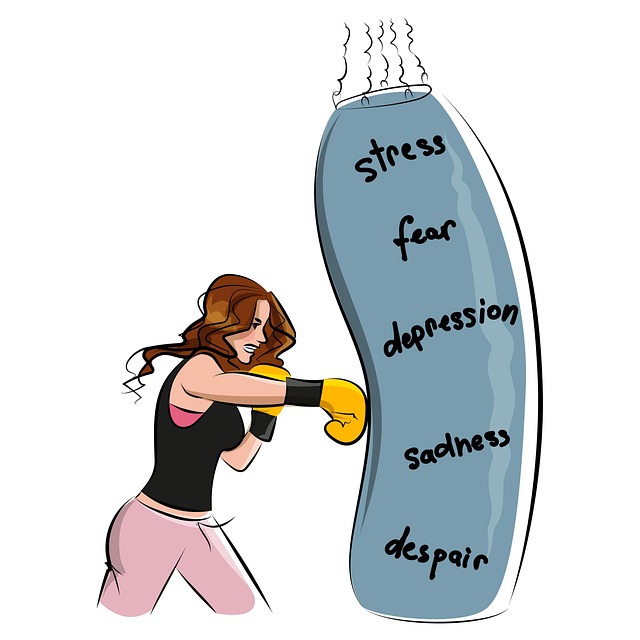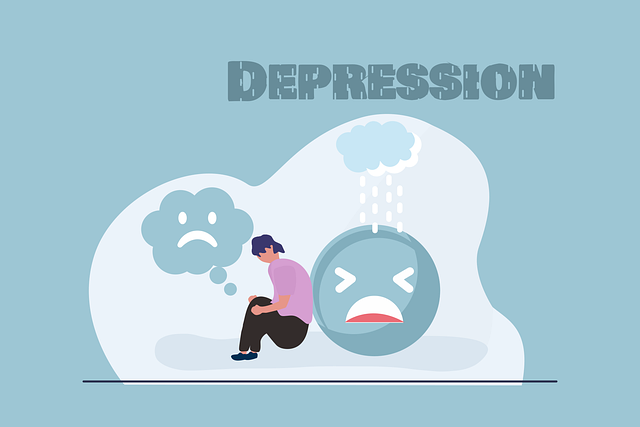Burnout, characterized by emotional exhaustion, depersonalization, and reduced personal accomplishment, is a significant issue for healthcare providers, including those at Northglenn Biofeedback Therapy centers. It arises from factors like high-stress environments, heavy workloads, and intense patient interactions. Early identification and mitigation are crucial; effective strategies include open communication, Stress Management Workshops, empathy building, and community fostering. Northglenn Biofeedback Therapy, combined with these approaches, reduces emotional strain and enhances job satisfaction. A supportive work environment prioritizing well-being, resilience-building, and mood management further prevents burnout. Self-care holistic practices, including exercise, mental techniques, open dialogue, and awareness campaigns, empower healthcare providers to manage stress and maintain long-term effectiveness in patient service. Evidence-based interventions like Northglenn Biofeedback Therapy offer hope for burnout prevention.
Healthcare provider burnout is a growing concern, impacting not just individual well-being but also patient care. This comprehensive guide explores effective strategies to prevent and mitigate burnout among healthcare workers. We delve into the root causes, including the unique challenges of high-stress environments, and highlight innovative solutions like Northglenn Biofeedback Therapy for stress reduction. Additionally, we explore supportive work cultures, self-care practices, and evidence-based interventions, offering a holistic approach to fostering resilience in medical professionals.
- Understanding Burnout Among Healthcare Providers
- The Role of Northglenn Biofeedback Therapy in Stress Reduction
- Creating a Supportive Work Environment
- Enhancing Self-Care Practices for Long-Lasting Well-being
- Evidence-Based Interventions for Burnout Prevention
Understanding Burnout Among Healthcare Providers

Burnout among healthcare providers is a growing concern, impacting both individual well-being and patient care quality. It’s characterized by emotional exhaustion, depersonalization, and reduced personal accomplishment, stemming from prolonged exposure to high-stress work environments. Healthcare professionals, particularly those in demanding specialties or settings like Northglenn Biofeedback Therapy centers, are at heightened risk due to heavy workloads, long hours, and intense patient interactions.
Identifying burnout early is crucial for healthcare organizations. Effective strategies include implementing communication strategies that encourage open dialogue about stress levels and emotional well-being, organizing Stress Management Workshops to equip staff with coping mechanisms, and fostering empathy building strategies that promote understanding and support among colleagues. These proactive measures can create a healthier work environment, enhance job satisfaction, and ultimately mitigate burnout risks.
The Role of Northglenn Biofeedback Therapy in Stress Reduction

Northglenn Biofeedback Therapy offers a unique and effective approach to stress reduction, providing healthcare providers with valuable tools to combat burnout. This therapy focuses on empowering individuals to take control of their physiological responses to stressful situations, allowing them to develop inner strength and resilience. By utilizing biofeedback techniques, healthcare professionals can learn to recognize and regulate their body’s stress reactions, leading to improved emotional well-being.
In addition to Northglenn Biofeedback Therapy, empathy building strategies and conflict resolution techniques play a pivotal role in preventing burnout. These methods foster positive connections between healthcare providers and patients, reducing the emotional strain associated with challenging interactions. By incorporating such strategies into their practice, healthcare professionals can enhance job satisfaction, improve patient outcomes, and create a healthier work environment.
Creating a Supportive Work Environment

In preventing healthcare provider burnout, creating a supportive work environment is paramount. This involves fostering a culture that prioritizes well-being and encourages open communication. At Northglenn Biofeedback Therapy, we understand that providing trauma support services can be emotionally taxing. Implementing resilience-building initiatives and mood management techniques helps professionals maintain balance. A supportive atmosphere includes adequate resources for stress relief, regular check-ins, and opportunities for staff to connect with one another, mirroring the benefits of a strong community.
By integrating these strategies, healthcare facilities can enhance job satisfaction and reduce burnout rates. Such environments promote better patient care as well, as happy and balanced professionals are more equipped to handle challenging situations. This, in turn, creates a positive feedback loop where improved working conditions lead to higher quality services and ultimately, better outcomes for patients.
Enhancing Self-Care Practices for Long-Lasting Well-being

In today’s demanding healthcare landscape, enhancing self-care practices is an essential strategy to combat burnout among providers. This involves a holistic approach to well-being, encompassing physical, mental, and emotional health. Healthcare professionals should prioritize regular exercise, nutritious meals, and sufficient sleep as foundational blocks for sustained energy levels throughout their shifts. Additionally, engaging in stress management techniques like mindfulness meditation, yoga, or Northglenn Biofeedback Therapy can significantly improve mood management and resilience to daily pressures. These practices not only help individuals recharge but also contribute to better patient care and job satisfaction.
Fostering a culture of open dialogue and public awareness campaigns development can further support healthcare providers’ mental wellness. The Mental Wellness Podcast Series Production, for instance, offers valuable insights and strategies for coping with stress, anxiety, and burnout. By encouraging peers to share their experiences and recovery techniques, these platforms create an environment where seeking help is normalized. Consequently, providers are empowered to take proactive steps towards self-care, ensuring they can continue to serve patients effectively in the long term.
Evidence-Based Interventions for Burnout Prevention

Burnout among healthcare providers is a growing concern, but evidence-based interventions offer hope for prevention. One such intervention gaining traction is Northglenn Biofeedback Therapy, which utilizes advanced techniques to help individuals manage stress and promote relaxation. This non-invasive approach has shown promising results in reducing burnout symptoms by teaching practitioners to control their physiological responses.
Additionally, Mental Wellness Journaling, Exercise Guidance, and Cultural Sensitivity in Mental Healthcare Practice have proven effective when integrated into daily routines. Keeping a journal allows healthcare workers to process emotions and reflect on challenging situations, while tailored exercise programs can improve physical and mental health. Moreover, incorporating Compassion Cultivation Practices has been linked to enhanced job satisfaction and reduced burnout by fostering empathy and understanding among caregiving staff.
Healthcare provider burnout is a pressing issue, but with the right strategies, it can be effectively mitigated. By understanding the causes and signs of burnout, healthcare professionals can proactively seek solutions such as Northglenn Biofeedback Therapy for stress reduction. Creating supportive work environments, prioritizing self-care, and adopting evidence-based interventions are crucial steps in fostering long-lasting well-being among medical personnel. These strategies not only benefit individual practitioners but also enhance patient care and organizational success.









